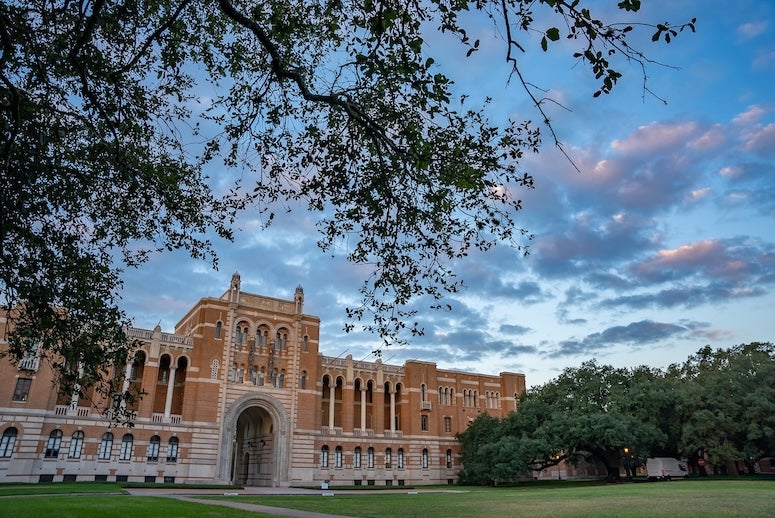The following message was sent to members of the Rice community May 2:
Dear Rice community,
The following Rice Values statement reaffirms one of the university’s most essential and cherished principles: academic freedom.
This statement underscores Rice’s unwavering commitment to academic freedom as a cornerstone of scholarly inquiry, open dialogue and the pursuit of knowledge. It also affirms our responsibility to foster a campus climate where every member of our diverse community feels respected and valued — even as we grapple with ideas that may challenge or unsettle us.
At Wednesday’s Faculty Senate meeting, members endorsed Rice leadership making this statement. The partnership this endorsement represents exemplifies the unique culture and exceptional faculty governance at Rice.
We are especially grateful to the members of the committee who developed this thoughtful statement: Allie Kieffer, associate professor of musicology; Danielle King, associate professor of psychological sciences; Carl Caldwell, professor of history; and Matthew Brake, associate professor of mechanical engineering. Their work — along with the efforts of many others involved in this endeavor — reflects the careful deliberation and dedication that this topic requires.
Academic freedom is more than a tradition or theory; it is a defining, living feature of what makes Rice a leading institution of higher learning. We encourage you to read the full statement below and join us in reflecting on its significance in the mission and work of the university.
Sincerely,
Reginald DesRoches
President
Amy Dittmar
Howard R. Hughes Provost and Executive Vice President for Academic Affairs
Rice Values Statement
The mission of Rice University is “groundbreaking research and unsurpassed education” (Rice University Mission Statement) in pursuit of the discovery, improvement, and dissemination of knowledge. Rice University thus reaffirms its unwavering support for academic freedom as vital to the function of the university and as a foundational value of the Rice community. Without it, the University cannot effectively investigate or teach our shared world. While the University strives to maintain a campus climate in which all members of the community feel respected and valued, its commitment to academic freedom necessarily encompasses ideas that challenge and unsettle us.
In accordance with its mission, consequently, Rice University upholds the freedom of the faculty, in their research and in the classroom, to explore fully the complexity of subject matter that pertains to their expertise or their instructional role. The University likewise affirms the freedom of faculty, students, and all members of the Rice community, including invited guests, to engage respectfully in conversation and debate without fear of censorship or retaliation, including of difficult or controversial ideas. The University supports all members and invited guests of the Rice community in their exercise of these freedoms both as members of this community and as citizens in a democratic society.
The University leadership strives to protect these freedoms by creating an environment that fosters inquiry and encourages civil discourse. Leading officers of the university, including the President, the Provost, deans, vice presidents, and other senior leaders, may, as individuals, hold positions regarding political and social issues, but as representatives of an institution that values free inquiry and critical dialogue they must weigh their words carefully and prioritize the mission of the university over their own participation in political discourse. Their role is to defend the special place of the university in the public sphere as an institution dedicated to investigation, teaching, and discussion. As university leaders whose public statements represent the university as a whole, these individuals should exercise restraint before commenting on contested societal issues. They are entrusted with the responsibility to discern whether, when, and how to defend specific political positions in support of Rice University’s mission. Other members of the Rice community who occupy positions of leadership, including department chairs and directors of centers or research groups, should also be mindful of their roles as spokespersons for their community and of the possibility that their speech could coerce into silence those who differ in their perspectives.

